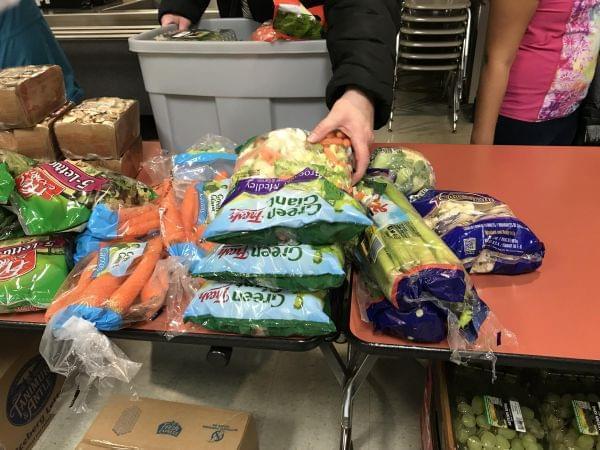If Shutdown Drags On, Programs Serving The Hungry In Illinois Could Be At Risk

A woman picks up food at the Eastern Illinois Foodbank distribution at Normal Community West High School on Dec. 16, 2017 Baylee Steelman/WGLT
People who rely on SNAP benefits to pay for food will continue to receive that assistance through at least February, even if the partial federal government shutdown continues.
But because of the shutdown, next month’s payment will come a couple weeks earlier than usual—on January 20th.
Craig Gunderson, professor of Agricultural and Consumer Economics at the University of Illinois at Urbana-Champaign, said the SNAP program is essential for alleviating food insecurity and hunger across the U.S.
“Study after study after study have shown, it has been extraordinarily successful in achieving this goal,” Gunderson said, speaking on The 21st show. “If it wasn’t for SNAP in our country, there would be literally millions more people hungry. And this is why it’s so really critical that SNAP benefits continue despite the government shutdown.”
Gunderson says the majority of the 1.8 million people in Illinois who receive SNAP benefits are children.
The Illinois Department of Human Services said in a statement that there’s no need for recipients of SNAP benefits to contact them at this time, and their staff will be working to ensure there’s no disruption in benefits.
Jim Hires, President and CEO of Eastern Illinois Foodbank, said he’s optimistic the partial federal government shutdown will end before there are any major disruptions to SNAP and other programs that serve the hungry.
Hires’ organization provides free and low-cost food to food pantries and other programs across 18 counties in eastern Illinois.
He said food pantries in the region haven’t seen increased demand caused by the government shutdown, since we lack high concentrations of federal workers.
But he said he worries about what would happen if the SNAP program—which is currently funded through February—were to run into problems.
“Any disruption to SNAP benefits in March would likely increase the demand on pantries and soup kitchens throughout the state,” Hires said. “That’s not a scenario we’re hoping to see.”
Hires said federal funding pays for about 20 percent of the food they distribute and also covers distribution costs.
Eastern Illinois Foodbank has received federal funding to last through March. Hires said he’s hopeful the federal government will reopen before that money runs out.
Gunderson, who conducts research on food insecurity, said he’s most concerned about the low-wage workers who aren’t getting paid.
He said research shows that unexpected income shocks can have a huge impact, especially for low-wage workers who may not have savings to fall back on.
For that reason, Gunderson said he’s most concerned about the shutdown’s impact on federal contract workers “who are cleaning up federal buildings, who are serving meals in the cafeteria of these federal buildings,” he said. “They’re the ones often furloughed, their incomes were already very low. We need to talk about federal workers, yes, but I think we need to (also) be talking about contract workers who do not make a lot of money.”
Follow Christine on Twitter: @CTHerman

